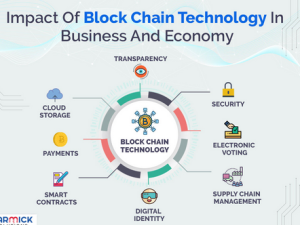Imagine blockchain technology as the superhero of business transactions and data security, swooping in to revolutionize the way we do things. Here’s a closer look at how this tech marvel transforms the business landscape:

Blockchain Technology
Table of Contents
ToggleImpact on Business Transactions:
- Transparency and Immutability:
- Think of blockchain as a magic ledger. It keeps an unchangeable record of transactions across a network, ensuring trustworthiness and transparency. Once data is in, it’s there to stay.
- Decentralization:
- Blockchain operates like a team rather than a solo act. It’s decentralized, removing the need for a bossy central authority. This teamwork minimizes fraud, manipulation, and the risk of a single point of failure.
- Smart Contracts:
- Enter the superheroes of efficiency—smart contracts. These self-executing contracts, written in code, automate and enforce agreements. They’re like trusty sidekicks, reducing the need for middlemen.
- Faster Settlements:
- Imagine blockchain as the speedster of settlements. It cuts through complexities in cross-border transactions, ditching intermediaries and speeding up the time needed for settlements.
- Cost Reduction:
- Blockchain is the cost-cutting magician. By removing middlemen and streamlining processes, it significantly slashes transaction costs, making businesses grin from ear to ear.
- Supply Chain Traceability:
- Picture blockchain as a detective, ensuring end-to-end traceability in supply chains. Every step is recorded, creating a tamper-proof history of a product’s journey.
- Tokenization of Assets:
- Blockchain transforms assets into tokens—like magical representations of ownership. This introduces new possibilities for fractional ownership and trading.
Impact on Data Security:
- Cryptographic Security:
- Blockchain uses cryptographic magic to secure transactions and control data access. It’s like an invisible shield, enhancing the overall security of the network.
- Consensus Mechanisms:
- Think of blockchain as a democracy. It relies on consensus mechanisms to validate and agree on transactions, making it a tough nut for malicious actors to crack.
- Distributed Ledger:
- Imagine data scattered across a network—this is the distributed ledger. It’s resilient to attacks, eliminating single points of failure and making data tampering-resistant.
- Private and Permissioned Blockchains:
- Blockchain understands the importance of privacy. Private and permissioned blockchains restrict access to authorized players, giving more control over sensitive data.
- Data Integrity:
- Blockchain is the guardian of data integrity. Once data is in, it becomes part of an unbreakable chain linked through cryptographic magic. Tampering with one block means messing with the entire chain.
- Decentralized Identity:
- Blockchain hands the reins of identity back to individuals. It establishes decentralized identity systems, reducing the risk of identity theft.
- Audibility and Compliance:
- Blockchain is the transparent auditor. Its traceable nature makes auditing transactions a breeze, ensuring compliance with regulatory requirements.
- Encrypted Smart Contracts:
- Smart contracts in blockchain are like secret agents with encrypted data. They execute complex business logic securely, without exposing sensitive information.
While blockchain brings these incredible benefits, businesses need to navigate the landscape carefully—considering scalability, regulations, and industry-specific needs. As this tech superhero continues to evolve, businesses are finding ingenious ways to harness its power for secure and efficient transactions.
